|
|
|
Sort Order |
|
|
|
Items / Page
|
|
|
|
|
|
|
| Srl | Item |
| 1 |
ID:
108317
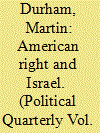

|
|
|
|
|
| Publication |
2011.
|
| Summary/Abstract |
In recent years there has been considerable controversy over the relationship between the United States and Israel. Neoconservatives and Christian Zionists have been vociferous in support of the relationship, while John Mearsheimer and other critics have questioned what America gains from such an alliance. While the G. W. Bush administration has often been portrayed as uncritically favouring Israel, it was the subject of criticism on the issue from within the American Right. Now it is the Obama administration which is drawing fire for its stance on Israel.
|
|
|
|
|
|
|
|
|
|
|
|
|
|
|
|
| 2 |
ID:
185908
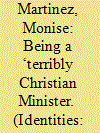

|
|
|
|
|
| Summary/Abstract |
Aiming to contribute to the debates on the entanglements among the far-right and anti-feminism Latin America, this article seeks to shed light on the performance of Damares Alves as Brazil’s Minister of Women, Family and Human Rights. Regarding Alves’s conservatism along her political career, particularly during the 2018 presidential run, this study provided an analysis on the reasons behind her prominence to the ongoing bolsonarism, and on how she contributed to building the gender knowledge that anchors the populist narrative in Bolsonaro’s political project. Concerning anti-feminist project’s foundations, as well as Alves’s performance as a Christian-conservative woman, a set of her speeches in the first 19 months of her term was scrutinised, by adopting the FCDA as methodology and using the thematic analysis as a method. The pointing of Alves’s discursive strategies revealed her attacks on feminisms, and the aim of legitimising herself and Bolsonaro’s political project as pro-women.
|
|
|
|
|
|
|
|
|
|
|
|
|
|
|
|
| 3 |
ID:
086411


|
|
|
|
|
| Publication |
2009.
|
| Summary/Abstract |
A conventional technocratic wisdom has begun to form that blames the failure of the US led invasion of Iraq on the small number of American troops deployed and the ideological divisions at the centre of the Bush administration itself. This paper argues that both these accounts are at best simply descriptive. A much more sustained explanation has to be based on a close examination of the ideological assumptions that shaped the drafting of policies and planning for the aftermath of the war. The point of departure for such an analysis is that all agency, whether individual or collective, is socially mediated. The paper deploys Antonio Gramsci's notion of 'Common Sense' to examine the Bush administration's policy towards Iraq. It argues that the Common Sense at work in the White House, Defence Department and Green Zone was primarily responsible for America's failure. It examines the relationship between the 'higher philosophies' of both Neoconservatism and Neo-Liberalism and Common Sense. It concludes that although Neoconservatism was influential in justifying the invasion itself, it was Neo-Liberalism that shaped the policy agenda for the aftermath of war. It takes as its example the pre-war planning for Iraq, then the disbanding of the Iraqi army and the de-Ba'athification of the Iraqi state. The planning and these two decisions, responsible for driving Iraq into civil war, can only be fully explained by studying the ideology that shaped them. From this perspective, the United States intervention in Iraq was not the product of an outlandish ideology but was instead the high water mark of post-Cold War Liberal interventionism. As such, it highlights the ideological and empirical shortcomings associated with 'Kinetic Liberalism'.
|
|
|
|
|
|
|
|
|
|
|
|
|
|
|
|
| 4 |
ID:
099063


|
|
|
|
|
| Publication |
2010.
|
| Summary/Abstract |
This article challenges the almost universal consensus that post-Cold War neoconservative foreign policy has been characterised by the objective of "exporting democracy" abroad for strategic or moral reasons or both. Instead, the article contends that the touchstone of neoconservatism was the attempt to preserve America's so-called "unipolar moment"-its apparent position as the single pole of power in every region of the world. Moving beyond the abstract and grandiose rhetoric employed by many neocons, the article points out that neocons made a distinction between the respective uses of military and non-military power, arguing that the former should be reserved only for situations where strategic interests were at stake rather than for the sake of ideals. The article goes on to argue that this focus on strategic interests facilitated a close alliance with other conservative nationalists who were also dedicated to maintaining America's position as the single pole of world power. Thus neoconservatism should be analysed and evaluated-by both conservatives and liberal interventionists alike-on the basis that it was a strategy dedicated primarily to preserving American unipolarity, not to the promotion of ideals.
|
|
|
|
|
|
|
|
|
|
|
|
|
|
|
|
| 5 |
ID:
086400
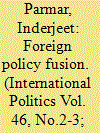

|
|
|
|
|
| Publication |
2009.
|
| Summary/Abstract |
Several tendencies in US foreign policy politics generated a new foreign policy consensus set to outlast the Bush administration. Three developments are analysed: increasing influence of conservative organizations - such as the Heritage Foundation, and of neoconservatism; and, particularly, democratic peace theory-inspired liberal interventionism. 9-11 fused those three developments, though each tendency retained its 'sphere of action': Right and Left appear to have forged an historically effective ideology of global intervention, an enduring new configuration of power. This paper analyses a key liberal interventionists' initiative - the Princeton Project on National Security - that sits at the heart of thinking among centrists, liberal and conservative alike. This paper also assesses the efficacy of the new consensus by exploring the foreign policy positions and advisers of President-elect Barack Obama and his defeated Republican rival, Senator John McCain, concluding that the new president is unlikely significantly to change US foreign policy.
|
|
|
|
|
|
|
|
|
|
|
|
|
|
|
|
| 6 |
ID:
084641


|
|
|
|
|
| Publication |
2008.
|
| Summary/Abstract |
There has been much controversy over the role that ethnic diasporas (sometimes called "lobbies") do or should play in shaping American foreign policy. This article looks at one particular ethnic group, American Jews, with a view to assessing the claim made by some authors, to the effect that "neoconservatism" has been influenced considerably by Judaism. The article mostly debunks that claim, at least if the suggestion is that something about Judaism as a religion can help account for the policy agendas espoused by neoconservatives in recent years. However, the authors do argue that a "geo-ethnic" link can be established between a Jewish diaspora in America and the evolution of neoconservatism. Their claim is that a "borderlands" tradition emanating originally on the Russian frontier in the latter part of the nineteenth century was exported to America, through the migration of peoples they refer to as "new borderers." This folk community, the authors argue, coalesced with another, well-established, folk community of "borderers" (the Scotch-Irish), resulting in the formation of the coalition known in recent years as neoconservatism - a coalition representing a fusion of Jacksonianism and Wilsonianism.
|
|
|
|
|
|
|
|
|
|
|
|
|
|
|
|
| 7 |
ID:
076557


|
|
|
| 8 |
ID:
177668
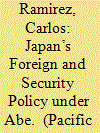

|
|
|
|
|
| Summary/Abstract |
Using Samuels’ [(2007). Securing Japan: The current discourse. The Journal of Japanese Studies, 33(1), 125–152] political categories of Japanese perspectives on strategic policy, this article argues that the nation’s foreign and security policy under the leadership of Prime Minister Shinzo Abe has undergone three distinct phases: a first phase of neoconservatism during his first tenure as Prime Minister from 2006 to 2007; a second period when he returned to the office of Prime Minister five years later in 2012 that can be described as neoautonomous; and a third phase of pragmatic realism from 2015 to 2016. In addition, this article analyses the factors driving change from one phase to another. By adopting an eclectic approach to theory, it claims that each traditional theory in the field of International Relations (IR) offers different but complementary causal effects to shifts in security and foreign policies. Each IR theory emphasizes or downplays these four factors: actors, structures, material forces and ideas. This article will employ all three IR traditional theories as they relate to these factors to discern the change factors of Abe’s foreign policy. Finally, it concludes by siding with those scholars who assert that Japan’s foreign policy has made a consequential break from its past and has embarked on a new path towards a remilitarization of its foreign and security policy.
|
|
|
|
|
|
|
|
|
|
|
|
|
|
|
|
| 9 |
ID:
086304
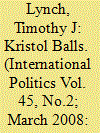

|
|
|
|
|
| Publication |
2008.
|
| Summary/Abstract |
This paper assesses American neoconservative policy prescriptions for democratizing political Islam and considers the sources of the neoconservative understanding of the Arab Muslim world. Neoconservative analyses of the Middle East are almost exclusively normative, arguing what US policy toward the region should be. Their aims are ambitious and inherently controversial. The paper examines what various neoconservatives have said and written about Islam and its democratic potential. The paper concerns itself with the neoconservative conceptualization of Middle East politics. The paper argues that presently only American neoconservatism, despite its variations, and despite some obvious flaws, offers tenable prescriptions for regime destabilization and an attendant political liberalization of Arab politics.
|
|
|
|
|
|
|
|
|
|
|
|
|
|
|
|
| 10 |
ID:
158012


|
|
|
|
|
| Summary/Abstract |
Harvard professor Samuel P. Huntington has frequently been considered a Vietnam War hawk. His observation that ‘forced-draft urbanization’ might help the United States win the war has come to define his engagement in contemporary strategic debates. This essay argues that both Huntington’s academic work and his private policy advice to the U.S. Government in fact urged a political settlement to the conflict. It argues that in spite of this, Huntington refused to break publicly with the U.S. policy because of his wider concern over what he saw as a crisis of authority in the U.S. foreign policy and governing institutions in the era.
|
|
|
|
|
|
|
|
|
|
|
|
|
|
|
|
| 11 |
ID:
069421
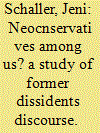

|
|
|
| 12 |
ID:
076346
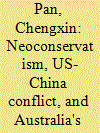

|
|
|
|
|
| Publication |
2006.
|
| Summary/Abstract |
Following its time-honoured 'great and powerful friends' foreign policy tradition, Australia has been cultivating close ties simultaneously with the United States and China. Yet, as a rivalry between the two powers apparently looms large, Australia faces an acute dilemma. While the rise of China and the question of Taiwan are often cited as main causes of US-China discord, this article argues that the American neoconservative policy on China, underpinned by a belief in both military strength and moral clarity, is integral to this growing competition and is, by extension, partly responsible for the emergence of Australia's predicament. To avoid such a difficult choice, the article suggests that Australia should strive to curb the policy influence of neoconservatism both in the United States and at home by pursuing a more independent foreign policy, making clear its strategic postures on US-China relations, and helping establish a trilateral strategic forum between Australia, the United States, and China.
|
|
|
|
|
|
|
|
|
|
|
|
|
|
|
|
| 13 |
ID:
142086


|
|
|
|
|
| Summary/Abstract |
Peace through strength, regime change to democracy, and preemptive strikes are known to be neoconservative policies which are based on such values as hegemonic stability, democratic peace and war as a necessary evil. If a Republican candidate wins office in January 2017, the new U.S. administration will undertake a bottomup-review of the North Korea policy. The key variable will be whether North Korea returns to the dialogue or conducts another long-range missile test and/or nuclear test before the new U.S. administration comes in. If the long-range missile test makes a big advance by confirming North Korea’s capability of reaching the U.S. mainland and if the nuclear test turns out to be a success of miniaturizing nuclear warheads that can be placed on the top of ICBMs, the new U.S. administration will take it as a game changer. This kind of strategic game changer could revive neoconservatism that has been ostensibly dead in the U.S. security community and it could be applied to North Korea.
|
|
|
|
|
|
|
|
|
|
|
|
|
|
|
|
| 14 |
ID:
061567
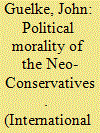

|
|
|
|
|
| Publication |
Mar 2005.
|
| Summary/Abstract |
Neoconservatism as a doctrine has been subjected to a great deal of scrutiny due to its profound influence on American foreign policy. In particular, much has been made of the enthusiasm for strong-armed tactics. However, in recent scholarship the role of private ethics and social values in neo-conservative thought has been neglected, restricted in the main to considerations of the spread of democracy. This is unfortunate, as the means and ends of neo-conservative foreign policy may be strongly considered to derive from the domestic concerns of their moral philosophy. The increasingly widespread invocation of moral values, far from empty rhetoric, is key to understanding the rejection of realist restraints and objectives for an interventionism uninhibited by norms, treaties, multilateral institutions or law.
|
|
|
|
|
|
|
|
|
|
|
|
|
|
|
|
| 15 |
ID:
075104
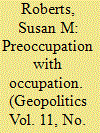

|
|
|
| 16 |
ID:
070818


|
|
|
| 17 |
ID:
119232
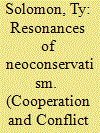

|
|
|
|
|
| Publication |
2013.
|
| Summary/Abstract |
Since 2003, scholars and pundits alike have vigorously debated the role of neoconservatism in the run-up to the US invasion of Iraq. Few, however, have examined the power of neoconservatism in terms of its resonance on an affective level. To more fully understand the influence that neoconservatism has had in recent US foreign policy debates, this article argues that scholarly analyses should also examine what could be termed its discursive efficacy. Neoconservatism incorporates many images and symbols of what many Americans would consider as being 'American', and the affective force of this discourse is vital in understanding its resonance with audiences. Employing insights from psychoanalytic theory, this article argues that a critically under-examined aspect of neoconservatism's varying influence on US foreign policy debates is found in the kinds of identifications that it offers audiences. The article, in this sense, contributes to the growing literature on neoconservatism, and raises the under-explored issue of resonance for the study of security discourses.
|
|
|
|
|
|
|
|
|
|
|
|
|
|
|
|
| 18 |
ID:
066279
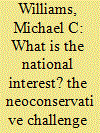

|
|
|
|
|
|
|
|